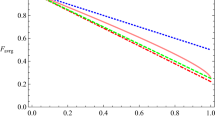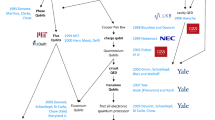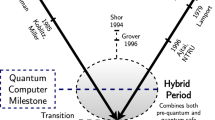Abstract
This paper presents a novel (3, 3) quantum secret sharing scheme using GHZ product state. Using the classical information to be shared, a dealer toggles the qubits, and then shares the product state. The other three parties make their Bell measurements and collude to reconstruct the secret. Unlike the other existing protocols, the proposed protocol does not involve the entire initial state in the secret reconstruction and discard the redundant qubits at the time of reconstruction to decode the secret. The protocol also allows for security against malicious attacks by an adversary without affecting the integrity of the secret. The security of the protocol lies in the fact that each party’s correct announcement of their measurement is required for reconstruction, failing which the reconstruction process is jeopardized, thereby ascertaining the (3, 3) scheme which has the potential to be generalized to a (t, t) protocol in a similar way. The simulation of the protocol has been performed on IBM-QE platform with backend providers IBMQ_16_Melbourne, IBMQ_Casablanca and IBMQ_Qasm_simulator_V0.1.547.







Similar content being viewed by others
References
Shamir, A.: How to share a secret. Commun. ACM 22(11), 612–613 (1979)
Hillery, M., Bužek, V., Berthiaume, A.: Quantum secret sharing. Phys. Rev. A 59(3), 1829 (1999)
Karlsson, A., Koashi, M., Imoto, N.: Quantum entanglement for secret sharing and secret splitting. Phys. Rev. A 59(1), 162 (1999)
Xiao, L., Long, G.L., Deng, F.-G., Pan, J.-W.: Efficient multiparty quantum-secret-sharing schemes. Phys. Rev. 69(5), 052307 (2004)
Zhang, Z.-J., Li, Y., Man, Z.-X.: Multiparty quantum secret sharing. Phys. Rev. A 71(4), 044301 (2005)
Guo, G.-P., Guo, G.-C.: Quantum secret sharing without entanglement. Phys. Lett. A 310(4), 247–251 (2003)
Tittel, W., Zbinden, H., Gisin, N.: Experimental demonstration of quantum secret sharing. Phys. Rev. A 63(4), 042301 (2001)
Li, Y., Zhang, K., Peng, K.: Multiparty secret sharing of quantum information based on entanglement swapping. Phys. Lett. A 324(5–6), 420–424 (2004)
Zu-Rong, Z., Wei-Tao, L., Cheng-Zu, L.: Quantum secret sharing based on quantum error-correcting codes. Chinese Phys. B 20(5), 050309 (2011)
Gu, B., Mu, L., Ding, L., Zhang, C., Li, C.: Fault tolerant three-party quantum secret sharing against collective noise. Opt. Commun. 283(15), 3099–3103 (2010)
Yang, Y.-G., Teng, Y.-W., Chai, H.-P., Wen, Q.-Y.: Fault-tolerant quantum secret sharing against collective noise. Phys. Script. 83(2), 025003 (2011)
Musanna, F., Kumar, S.: A novel three-party quantum secret sharing scheme based on bell state sequential measurements with application in quantum image sharing. Quant. Inform. Process. 19(10), 1–21 (2020)
Mashhadi, S., Dehkordi, M.H., Kiamari, N.: Provably secure verifiable multi-stage secret sharing scheme based on monotone span program. IET Inform. Secur. 11(6), 326–331 (2017)
Qin, H., Dai, Y.: Verifiable (t, n) threshold quantum secret sharing using d-dimensional bell state. Inform. Process. Lett. 116(5), 351–355 (2016)
Qin, H., Tso, R., Dai, Y.: Multi-dimensional quantum state sharing based on quantum fourier transform. Quant. Inform. Process. 17(3), 48 (2018)
Xiao, H., Gao, J.: Multi-party d-level quantum secret sharing scheme. Int. J. Theoret. Phys. 52(6), 2075–2082 (2013)
Yang, W.: Liusheng Huang, Runhua Shi, and Libao He. Secret sharing based on quantum fourier transform. Quant. Inform. Process. 12(7), 2465–2474 (2013)
Mashhadi, S.: General secret sharing based on quantum fourier transform. Quant. Inform. Process. 18(4), 114 (2019)
Williams, B.P., Lukens, J.M., Peters, N.A., Qi, B., Grice, W.P.: Quantum secret sharing with polarization-entangled photon pairs. Phys. Rev. A 99(6), 062311 (2019)
Zhou, Y., Yu, J., Yan, Z., Jia, X., Zhang, J., Xie, C., Peng, K.: Quantum secret sharing among four players using multipartite bound entanglement of an optical field. Phys. Rev. Lett. 121(15), 150502 (2018)
Greenberger, D.M., Horne, M.A., Zeilinger, A.: Bell’s theorem, quantum theory, and conceptions of the universe, (1989)
IBM quantum computing platform. https://www.ibm.com/quantum-computing/
Acknowledgements
One of the authors, Farhan Musanna, is grateful to the Ministry of Human Resource Development, India and the Indian Institute of Technology, Roorkee for being the funding agency of this work. The grant number is MHR-01-23-200-428. The work is also partially funded by the project grant no. CRG/2020/002040 of SERB New Delhi, India. The authors are extremely thankful to IBM for providing access to their Quantum Experience (IBM-QE) cloud servers.
Author information
Authors and Affiliations
Corresponding author
Additional information
Publisher’s Note
Springer Nature remains neutral with regard to jurisdictional claims in published maps and institutional affiliations.
Rights and permissions
Springer Nature or its licensor (e.g. a society or other partner) holds exclusive rights to this article under a publishing agreement with the author(s) or other rightsholder(s); author self-archiving of the accepted manuscript version of this article is solely governed by the terms of such publishing agreement and applicable law.
About this article
Cite this article
Musanna, F., Kumar, S. Quantum Secret Sharing using GHZ State Qubit Positioning and Selective Qubits Strategy with Simulation Analysis. Int J Theor Phys 61, 255 (2022). https://doi.org/10.1007/s10773-022-05237-0
Received:
Accepted:
Published:
DOI: https://doi.org/10.1007/s10773-022-05237-0




